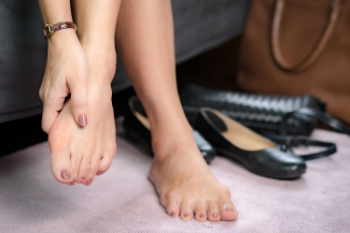
A bunion is more than a bump on the side of the foot. It forms when the joint at the base of the big toe gradually shifts out of alignment, causing the toe to angle inward. This can lead to pain, swelling, and difficulty finding comfortable shoes. Bunions often develop over time and may be influenced by inherited foot structure, poor footwear choices, or medical conditions such as arthritis. Ignoring a bunion may cause the symptoms to worsen. Over time, it can limit mobility and change the way a person walks. Conservative measures such as padded inserts, toe spacers, and proper footwear may offer relief. When those options fail, a podiatrist may recommend surgery to realign the joint and restore function. If your big toe joint feels sore, stiff, or visibly out of place, it is suggested that you consult a podiatrist for appropriate treatment.
If you are suffering from bunion pain, contact one of our podiatrists of Save Your Soles. our doctors can provide the care you need to keep you pain-free and on your feet.
What Is a Bunion?
Bunions are painful bony bumps that usually develop on the inside of the foot at the joint of the big toe. As the deformity increases over time, it may become painful to walk and wear shoes. Women are more likely to exacerbate existing bunions since they often wear tight, narrow shoes that shift their toes together. Bunion pain can be relieved by wearing wider shoes with enough room for the toes.
Causes
- Genetics – some people inherit feet that are more prone to bunion development
- Inflammatory Conditions - rheumatoid arthritis and polio may cause bunion development
Symptoms
- Redness and inflammation
- Pain and tenderness
- Callus or corns on the bump
- Restricted motion in the big toe
In order to diagnose your bunion, your podiatrist may ask about your medical history, symptoms, and general health. Your doctor might also order an x-ray to take a closer look at your feet. Nonsurgical treatment options include orthotics, padding, icing, changes in footwear, and medication. If nonsurgical treatments don’t alleviate your bunion pain, surgery may be necessary.
If you have any questions, please feel free to contact our offices located in Abington and Willow Grove, PA . We offer the newest diagnostic and treatment technologies for all your foot care needs.
